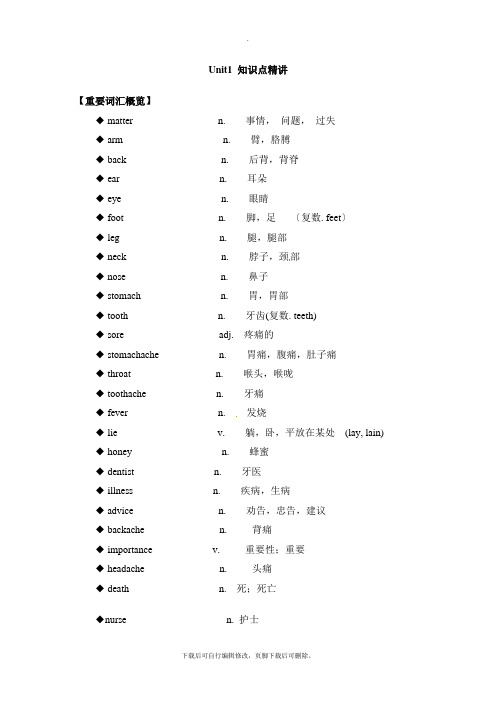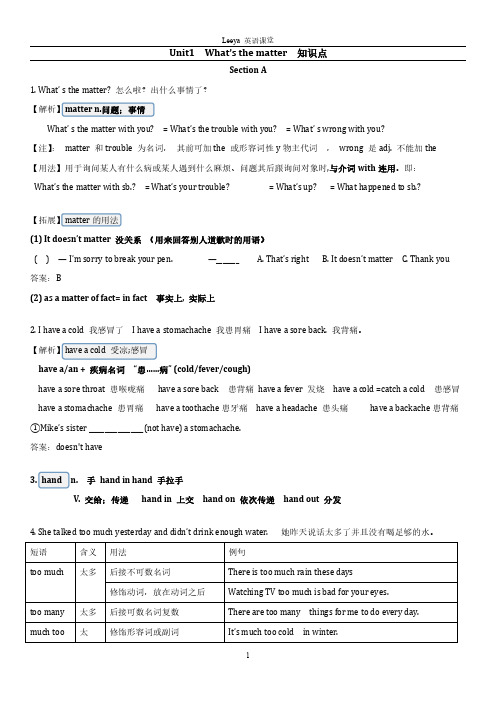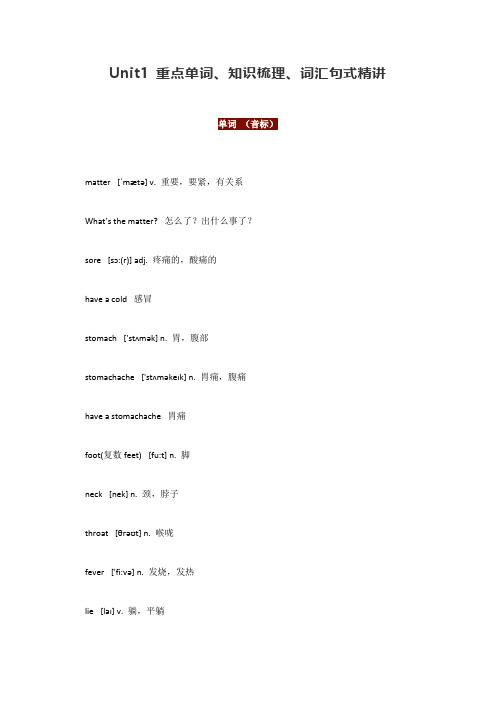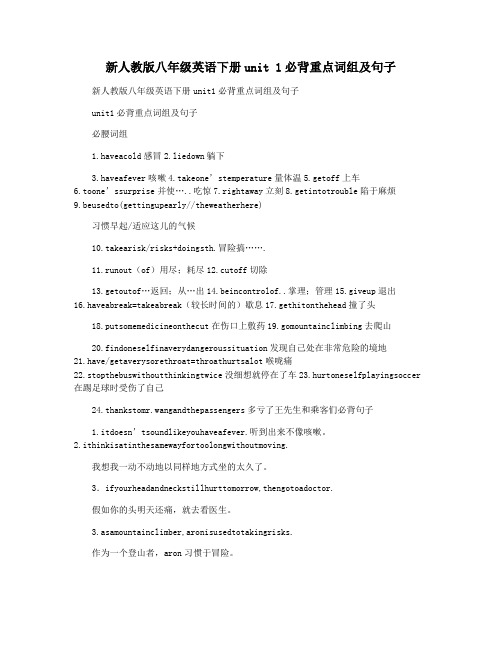八年级下册英语Unit1知识点
最全面人教版八年级下册英语第一单元知识点归纳总结

Unit 1 What's the matter?一、词汇与短语◆重点单词A部分1.matter n. 问题;事情2.sore adj. 疼痛的;酸痛的3.stomachache n. 胃痛;腹痛4.foot n. 脚;足5.neck n. 颈;脖子6.stomach n. 胃;腹部7.throat n. 咽喉;喉咙8.hurt v. (使)疼痛;受伤9.fever n. 发烧10.passenger n. 乘客;旅客11.lie v. 躺;平躺12.break n. 间歇;休息13.rest v. &n. 放松;休息14.onto prep. 向;朝15.X-ray n. X射线;X光16.trouble n. 问题;苦恼17.toothache n. 牙痛18.hit n. (用手或器具)击;打19.headache n. 头痛20.herself pron. (she的反身代词)她自己21.off adv. & prep. 离开(某处);不工作;从……去掉B部分1.bandage n. 绷带v. 用绷带包扎2.press v. 压;挤;按3.sick adj. 生病的;有病的4.knee n. 膝;膝盖5.breathe v. 呼吸6.knife n. 刀7.sunburned adj. 晒伤的8.blood n. 血9.ourselves pron. (we反身代词)我们自己10.mean v. 意思是;打算11.climber n. 登山者;攀登者12.importance n. 重要性;重要13.risk n.&v. 危险;风险;冒险14.decision n. 决定;抉择15.accident n.(交通)事故;意外遭遇16.control v.&n. 限制;约束;管理17.situation n. 情况;状况18.spirit n. 勇气;意志19.kilo( = kilogram) n. 千克;公斤20.death n. 死;死亡21.rock n. 岩石22.nurse n. 护士◆重点短语A部分1.have a cold 感冒2.lie down 躺下3.have a stomachache 胃痛4.take one's temperature 量体温5.have a fever 发烧6.to one's surprise 使……惊讶的是7.get off 下车8.right away 立即;马上9.take breaks (take a break) 休息10.talk too much 说得太多11.drink enough water 喝足够的水12.have a very sore throat 嗓子非常疼13.get an X-ray 拍X光片14.see a dentist 看牙医15.drink some hot tea with honey 喝一些加蜂蜜的热茶16.put some medicine on sth.在……上面敷一些药17.feel very hot 感到很热18.sound like 听起来像19.all weekend 整个周末20.in the same way 以同样的方式21.go to a doctor 看医生22.go along 沿着……走23.on the side of the road 在马路边24.shout for help 大声呼救25.without thinking twice 没有多想26.have a heart problem 有心脏病27.thanks to 多亏了;由于28.in time 及时29.save a life 挽救生命30.get into trouble 陷入麻烦31.hurt oneself 受伤32.fall down落下;摔倒B部分1.be used to 习惯于……;适应于……2.in a difficult situation 在困境中3.take risks (take a risk) 冒险4.keep on doing sth. 继续(或坚持)做某事5.run out (of) 用尽;耗尽6.make a decision 作出决定7.cut off 切除8.get hit on the head 撞到头部9.get out of 离开;从……岀来10.be interested in 对……感兴趣11.give up 放弃12.mean doing sth. 意味着做某事13.put a bandage on sth. 用绷带包扎…14.lose one's life 失去生命15.feel sick 感到恶心16.mountain climbing 登山运动17.have problems breathing 呼吸困难18.be in control of 掌管;管理◆重点句子A部分1.What's the matter with you?=What's the trouble with you?=What's wrong with you?你怎么了?2.What should she do? 她该怎么办呢?3.Did you fall down? 你跌倒了吗?4.Should I take my temperature? 我应该量一下体温吗?5.I think I sat in the same way for too long without moving.我想我以同样的姿势一动不动地坐得太久了。
八年级英语下册Unit1重要语法点汇总

八年级英语下册Unit1重要语法点汇总重要语法点一、询问某人的健康问运及遭到麻烦的表达方法(1)询问某人患了何种疾病或遇到了何种麻烦时,常用以下几种结构来表达:What’s the matter (with sb.)?(某人)怎么了?What’s wrong (with sb.)?(某人)怎么了?What’s the trouble (with sb.)?(某人)出什么事了?What happened (to sb.)?(某人)发生了什么事?Are you OK?你没事吧?Is there anything wrong with sb.?某人有什么事吗?(2)要表达身体疼痛或不舒服,可用以下结构:1.某人+have/has+病症.The twins have colds.双胞胎感冒了。
2.+have/has+a+headache/toothache/stomachache/backache/ea rache.She had a stomachache last night.她昨晚肚子痛。
3.某人+have/has+a+sore+发病部位.He has a sore throat.他喉咙痛。
4某人+hurt(s)+身体部位或反身代词.He hurt his leg.他的腿受伤了。
5某部位+hurt(s).My head hurts badly.我头痛得厉害。
6某人+have/has+a pain+in one’s+身体部位,I have a pain in my chest.我胸口痛。
7.(There is)something wrong with one’s+身体部位.There is something wrong with my right eye..我的右眼有毛病。
8.其他表达方式She has a heart trouble.她有心脏病。
He got hit on the head他头部受到了撞击。
Unit1语法知识点梳理人教版英语八年级下册

人教版八年级英语下册语法知识点Unit1. What’s the matter?▶短语归纳1.have a cold 感冒2. have a stomachache 胃痛3. have a headache 头痛4. have a sore throat 喉咙痛5. have a fever 发烧6. have a cough 咳嗽7. have a heart problem 有心脏病8.hurt oneself伤到自己9.cut oneself割伤自己10.fall down 摔倒;跌倒11.get hit/sunburned 被击中/晒伤12. lie down 躺下13. take breaks/take a break 休息14. go to a/the doctor 看医生15.see a dentist 看牙医16. get an Xray 拍个X光片17. take one's temperature 量体温18. put some medicine on...在…上敷些药19.take sb. to the hospital带某人去医院20. take risks/take arisk冒险21.lose one’s life 失去生命22.run out(of)用尽;耗尽23.cut off 切除24.away from 远离25. make a decision /make decisions 做决定26.sound like 听起来好像27.get out of离开;从………出来28. get off 下车29. get to 到达30.get into 陷人;参与31.wait for 等待32.think twice 慎重考虑,再三考虑33.think about 考虑34. go mountain climbing 去爬山35. give up 放弃36. tell of叙述;描述37. the importance of……的重要性38. be interested in 对……感兴趣39. be in control of掌管;管理40.to one ’s surprise 使某人惊讶的是; 出乎某人的意料 41.thanks to 多亏;由于 42.in time 及时43.right away=at once 立即;马上 44. because of 因为 45.by oneself 独自;单独 46. too much 太多 47.a few 一些48.all weekend 整个周末 49. so that 以便▶用法集萃sth.需要某物1. needto do sth.需要做某事doing sth.某事需要被做2. see sb ..doing sth.看见某人正在做某事 do sth.看见某人做了某事3.mean to do sth.打算做某事 doing sth.意味着做某事4. expect/want (sb. ) to do sth 期待(某人)做某事/想要(某人)做某事 6. seem(to be)+形容词 好像……seem to do sth.好像做某事 seem + that 从句 好像.…7. agree/happen to do sth. 同意做某事/碰巧做某事 8.help sb.(to)do sth. 帮助某人做某事9.tell sb.(not)to do sth. 告诉某人(不要)做某事10.have problems(in)doing sth. 做某事有困难11. use sth. to do sth.= use sth. for doing sth.用某物做某事12. give up/ keep on doing sth. 放弃做某事/继续做某事13.mind doing sth.介意做某事14.so+形容词/副词+that从句15.It is/was+形容词+ that 从句如此……以至于…"某事是…▶语法专项一.询问某人的健康问题及遇到麻烦时的常用表达1.询问某人患了何种疾病或遇到了何种麻烦时,常用以下几种结构来表达: What's the matter (with sb.)?(某人)怎么了?What's wrong (with sb.)?(某人)怎么了?What's the trouble ( with sb.)?/ (某人)出什么事了?What happened (to sb.)?(某人)发生什么事了?Are you OK?你没事吧?Is there anything wrong( with sb. )?(某人)有什么事吗?2.要表达身体某一部位疼痛或不舒服,可用以下结构:(1)某人+have/has+病症The twins have colds.这对双胞胎感冒。
八年级人教版英语下册unit1知识点总结

八年级人教版英语下册unit1知识点总结Unit1是八年级英语下册的第一单元,主要围绕“the sentence”这一主题展开。
在学习中,我们需要掌握一些重要的知识点,本文将对这些知识点进行总结。
一、句子的构成句子是表达完整意义的语言单位,主要由主语、谓语和宾语三部分构成。
其中,主语是句子的主要话题或动作的执行者,通常位于句子的最前面;谓语是句子的核心,描述主语的动作或状态;宾语是句子的补充说明,通常位于谓语之后。
句子的构成还包括句子成分和句子成分的分类。
句子成分包括主语、谓语、宾语、表语、定语和状语等。
句子成分的分类主要有三种,即主谓结构、主、谓、宾结构和主系表结构。
二、句子的种类英语中根据句子的用途和表达方式,可以分为陈述句、疑问句、祈使句和感叹句四种。
其中,陈述句用来陈述事实、肯定或否定某种情况,一般语序为主谓宾,常以句号结尾;疑问句用来询问问题,通常以问号结尾;祈使句用来表达请求、命令或建议等语气,通常省略主语,以动词原形开头;感叹句用来表达强烈的情感,常以感叹词或how引导。
三、句子的语态和时态英语中的语态有两种,即主动语态和被动语态。
主动语态表示主语执行动作,而被动语态则表示主语受到动作的影响。
时态是句子非常重要的一部分,用来表示动作发生的时间。
英语中时态主要有现在时、过去时和将来时三种。
其中,现在时表示现在或经常性的动作;过去时表示过去发生的动作;将来时表示将来要发生的动作。
四、句子的修辞手法修辞手法是指用以增强语言表现力的一些技巧或方法,英语中常见的修辞手法包括比喻、拟人、排比、反问、设问、修饰语等。
其中,比喻是常用的一种修辞手法,用来通过两个事物之间的共性来形象地说明某一现象或情况,增强语言的表现力。
拟人则是将非人事物或抽象物质化为人来进行描述,以增强表达的感染力。
以上是八年级人教版英语下册Unit1的知识点总结,希望能够对大家在学习中有所帮助。
人教版八年级下册英语Unit 1重点知识汇总

人教版八年级下册英语Unit 1重点知识汇总重点单词matter v. 重要,要紧,有关系What's the matter? 怎么了?出什么事了?sore adj. 疼痛的,酸痛的have a cold 感冒stomach n. 胃,腹部stomachache n. 胃痛,腹痛have a stomachache 胃痛foot (复数feet) n. 脚neck n. 颈,脖子throat n. 喉咙fever n. 发烧,发热lie v. 躺,平躺lie down 躺下rest n. 剩余部分,其余;放松,休息cough n. & v. 咳嗽X-ray n. X光,X射线toothache n. 牙痛take one's temperature 量体温headache n. 头痛have a fever 发烧break n. & v. 休息,暂停;打破take breaks (take a break)休息hurt v. 伤害,损害,使受伤passenger n. 乘客,旅客off adv. prep. 离开(某处);从…去掉get off 下车to one's surprise 使…惊讶,出乎…意料onto prep. 向,朝trouble n. 麻烦,烦扰,问题hit n. & v. 碰撞,打,打击right away 立即,马上get into 陷入,参与herself pron. 她自己,她本身(she的反身代词)bandage n. & v. 绷带;用绷带包扎sick adj. 患病的,不适的knee n. 膝盖nosebleed n. 鼻出血breathe v. 呼吸sunburned adj. 晒伤的ourselves pron. 我们自己(we的反身代词)climber n. 登山者be used to 习惯于…适应于…risk n. & v. 风险,危险;冒险take risks (take a risk) 冒险accident n. 意外事件;事故situation n. 状况,形式,情况kg=kilogram n. 公斤,千克rock n. 岩石run out (of) 用尽,耗尽knife n. 刀,餐刀cut off 切除blood n. 血mean v. 意味着,意思是,意欲get out of 离开,从…出来importance n. 重要性decision n. 决心,决定,抉择control v. 控制,支配,操纵be in control of 掌管,管理spirit n. 勇气,意志death n. 死亡give up 放弃nurse n. 护士重点短语1.have a fever 发烧2.have a cough 咳嗽3.have a toothache牙疼4.talk too much说得太多5.drink enough water 喝足够的水6.have a cold 受凉;感冒7.have a stomachache 胃疼8.have a sore back 背疼9.have a sore throat 喉咙痛10. take risks 冒险11.hot tea with honey 加蜂蜜的热茶12.see a dentist 看牙医13.get an X-ray 拍 X 光片14.take one's temperature 量体温15.put some medicine on sth. 在……上面敷药16. give up 放弃17. sound like 听起来像18. all weekend 整个周末19. in the same way 以同样的方式20. go to a doctor 看医生21. go along 沿着……走22. on the side of the road 在马路边23. shout for help 大声呼救24. without thinking twice 没有多想25. get off 下车26. have a heart problem 有心脏病27. to one's surprise 另某人惊讶的是28. thanks to 多亏了;由于29. in time 及时30. make a decision 做出决定31. get into trouble 造成麻烦32. right away 立刻;马上33. because of 由于34. get out of 离开;从……出来35. keep on doing sth. 继续或坚持做某事36. put a bandage on sth. 用绷带包扎37. fall down 摔倒38. feel sick 感到恶心39. have a nosebleed 流鼻血40. cut his knee 割伤他的膝盖41. put her head back 把她的头向后仰42. have problems breathing 呼吸困难43. mountain climbing 登山运动44. be used to doing sth. 习惯做某事45. run out (of) 用完;用尽46. so that 以便47. so...that... 如此……以至于...…48. be in control of 掌管;管理49. in a difficult situation 在闲境中重点句型1. What's the matter with you?= What'the trouble with you?= What's wrong with you? 你怎么了?2. What should she do? 她该怎么办呢?3.Should I take my temperature? 我应该量一下体温吗?4.You should lie down and rest. 你应该躺下休息一会儿。
英语八年级下册m1知识点

英语八年级下册m1知识点英语八年级下册M1是说英语八年级下册的第一模块,这个模块主要是讲述了一些重要的知识点,在这里我们来一一了解一下。
一、动词时态动词时态是英语语言中非常重要的一部分,我们必须掌握好它。
动词时态包括:现在时、过去时和将来时。
现在时表示现在正在发生的事情,过去时表示已经发生了的事情,将来时表示将要发生的事情。
二、被动语态被动语态是一个非常常用的语法形式,它用于表示动作的承受者。
例如:这本书被我借走了。
在这个句子中,“这本书”是承受者,“我”是动作的执行者。
三、宾语从句宾语从句是一个包含在宾语中的子句,它常常作为主句的宾语。
例如:我知道他在做什么。
在这个句子中,“他在做什么”是宾语从句。
四、状语从句状语从句是一个包含在句子中的子句,它通常用来修饰句子中的动词,形容词或者副词。
例如:当我见到他时,他正在做功课。
在这个句子中,“当我见到他时”是状语从句。
五、比较级和最高级比较级和最高级是英语中用来比较两个或多个事物差异的基本形式。
比较级表示两个事物之间的大小或者差异,最高级用来表示三个或多个事物之间的大小或者差异。
六、情态动词情态动词是一组特殊的助动词,它们与其它动词搭配使用,用来表达肯定、否定、建议、请求、可能性、能力等。
例如:我可以帮助你。
在这个句子中,“可以”就是一个情态动词。
以上就是英语八年级下册M1的知识点总结。
我们如果掌握了这些语法规则,就能更好地学习英语,更好地理解和应用英语。
Unit1知识点归纳人教版八年级英语下册

八下Unit 11.W hat’s the matter?怎么了?What’s the matter with you? 你怎么了?这个句子常用来询问身体情况。
其他用法W hat’s the matter with your computer?你的电脑怎么了?同义句:W hat’s wrong (with…) ?2.Have a fever/ headache/ toothache/ stomachache/ sore throat/ sore back用have 表达身体上的不舒服(physical problems)3.see sb. lying on the side of the road看见某人躺在路边lie躺-lay-lain-lying4.without thinking twice _______________________________________think twice 多想5.shout for help大声求助,喊人帮忙ask for help求助6.hurt 及物动词:使受伤,使疼痛I hurt my leg yesterday_________________________________不及物动词:疼痛,带来伤害My leg hurts a lot.我的腿很疼。
hurt-hurt-hurt-hurtingget hurt受伤7.t o one’s surprise令某人惊讶的是To our surprise, the boy won the race. ___________________,那个男孩赢得了比赛in surprise惊讶地He looked at me in surprise, 他惊讶地看着我。
令我惊讶的是________________________ 令他们惊讶的是_______________________令Tom惊讶的是________________________8.get into trouble遇到麻烦,陷入麻烦troublen.困难;难题;动荡;骚乱;麻烦;机器故障;身体不适;工夫;力气;引起担心、不便的原因What’s the trouble?v.使烦恼;苦恼;忧虑;费力;费神;因…而烦恼;使疼痛;劳驾;麻烦The grammar troubled me a lot and even drove me crazy.语法让使我很烦,甚至让我发疯。
Unit1what’sthematter_SectionA知识点梳理人教版八年级英语下册

人教版八年级下册英语课本知识点梳理Unit 1 wh at’s the matter? sectionA课文内容:What's the matter? 怎么了? (教材第1页)【用法详解】What's the matter? 怎么了?/出什么事了?常用于询问某人患了何种疾病,遇到了什么困难等,也可用于询问某物出了什么故障,其后可接with sb./sth.,表示“某人/某物怎么了?”。
其中matter 用作名词,意为“问题;事情”matter前须加定冠词the。
【例句】What's the matter? 怎么了?Bad luck.I lost my pen. 真倒霉,我弄丢了钢笔.What's the matter with him? 他怎么了?He has a sore back.他背痛【拓展】matter[动词] 要紧;有关系多用在否定句、疑问句或条件句中It doesn't matter.没关系。
(通常用来回答对方的道歉)I have a cold. 我感冒了。
(教材第1页)【用法详解】have a cold (患)感冒。
其中have 用作及物动词,意为“患(病);遭受(病痛)”,常用于结构“have a/an +疾病名称”表示患病或身体某部位不舒服。
此时它不能用于进行时态,其第三人称单数形式为has,过去式为had。
常见的表示病痛的短语还有:have a fever 发烧have a toothache 牙疼have a headache头痛have a cough 咳嗽have a stomachache胃痛Do you often have a cold? 你经常感冒吗?Jim had a stomachache after supper yesterday.吉姆昨天晚饭后胃痛。
l have a stomachache.我胃痛。
( 教材第1 页)【用法详解】stomachache [名词]胃痛;腹痛是由“名词stomach(;腹部)+ache(疼痛)”构成的复合名词。
(完整版)Unit1人教版八年级英语下册语法与知识点,推荐文档

Unit 1第一部分:Grammar一、情态动词(Modal Verbs)情态动词should 意为“应该,应当”,必须和后面的动词原形一起构成谓语,没有人称和数的变化。
用以表达职责和义务、提出劝告,而且表述的是自己的主观看法。
注意:should 在以why,who,how 等疑问词开头的问句中,意为“竟然,居然,怎么会”,表示意外、惊喜或在说话人看来是不可思议的。
三、反身代词表示反射或强调的代词叫做反身代词。
反身代词是由第一人称、第二人称形容词性物主代词或第三人称代词的宾格形式,词尾加self 或selves 组成。
反身代词可译“本人”、“本身”,为加强语气,也常翻译为“亲自”、“自己”。
不定人称代词one ---- o neself.第二部分:单词用法Section A1.What’s the matter?怎么了?该句常用询问某人患了何种疾病或遇到了什么麻烦,其后用with 引出对象。
1). What’s the matter with sb.?=what’s wrong with sb.?=what’s the trouble/problem with sb.?=what’s one’s trouble/problem?e.g. What’s the matter w ith Tom?=what’s with Tom?=What’s the with Tom?=What’s Tom’s?2). matter, 名词,“问题,事情”e.g. We have important (matter) to discuss.我们有些重要的问题要讨论。
3). 动词,“要紧,关系重大”e.g. It dosen’t that you came late.2.I have a cold. 我感冒了。
1).have/get/catch a cold “感冒,着凉”The old man a cold yesterday.那位老人昨天感冒了。
人教版英语八年级下册Unit1 知识点精讲

Unit1 知识点精讲【重要词汇概览】◆ matter n.事情,问题,过失◆ arm n.臂,胳膊◆ back n.后背,背脊◆ ear n.耳朵◆ eye n.眼睛◆ foot n.脚,足〔复数. feet〕◆ leg n.腿,腿部◆ neck n.脖子,颈部◆ nose n.鼻子◆ stomach n.胃,胃部◆ tooth n.牙齿(复数. teeth)◆ sore adj.疼痛的◆ stomachache n.胃痛,腹痛,肚子痛◆ throat n.喉头,喉咙◆ toothache n.牙痛◆ fever n.发烧◆ lie v.躺,卧,平放在某处(lay, lain)◆ honey n.蜂蜜◆ dentist n.牙医◆ illness n.疾病,生病◆ advice n.劝告,忠告,建议◆ backache n.背痛◆ importance v. 重要性;重要◆ headache n. 头痛◆ death n. 死;死亡◆nurse n. 护士◆ knife n. (复数.knives)刀【重要词组概览】◆ have a cold患感冒◆ take breaks(take a break) 休息◆ lie down 躺下◆ get off 下车◆ be used to 习惯于...;适应于...◆ on the other hand另一方面◆ get a cold患感冒◆ see a dentist看牙医◆take one’s temperature 量体温◆ make sb sick使某人不舒服(患锁病)◆ have a sore throat嗓子痛◆ have a fever发烧,发热◆ have a toothache牙痛◆ have a backache背痛◆ have a headache头痛◆give up 放弃◆cut off 切除◆get out 〔of〕用尽;耗尽◆take risks〔take a risk〕冒险◆get into 陷入;参与◆right away 立即;马上◆to one’s s urprise 使...惊讶的;出乎...意料【语法知识聚焦】看病需要和医生交流,这是英语口语中必不可少的内容。
Unit 1 单元知识点总结课件--八年级英语下册(人教版)

02 作表语
描述身体/精神状态或感觉
常放be, feel, seem, look…后
You can be yourself.
03 作同位语
强调作用, 常作主语或宾语 的同位语, 表示“亲自,本人” The story itself is good. .
02
(die- died- died- dying)
She died 2 years ago.
04 dying adj. 垂死的,要死的
This is a dying bird.
2.7 risk
n. 危险,风险
the risk of … …的风险 Staying up will increase the risk of the illness.
lie down and rest / shouldn’t eat so much next time
④ have a toothache
see a dentist and get an X-ray
⑤ have a fever
take one’s temperature
⑥ have a headache
Words
matter, lie, enough, mean…
2.1 matter
n. 问题,事情
-- What’s the matter with you? -- I hurt my leg.
v. 要紧,有关系
It doesn’t matter.
2.2 enough
位置:前形副后
adj. 足够的,充足的 enough + n I have enough money.
(完整版)人教版八年级英语下册Unit1知识点讲解(可编辑修改word版)

Unit 1 重点知识讲解Grammar一、情态动词(Modal Verbs)情态动词should 意为“应该,应当”,必须和后面的动词原形一起构成谓语,没有人称和数的变化。
用以表达职责和义务、提出劝告,而且表述的是自己的主观看法。
1.should 的句式结构2.s hould 的用法喜或在说话人看来是不可思议的。
二、其他表示建议的句型表示反射或强调的代词叫做反身代词。
反身代词是由第一人称、第二人称形容词性物主代词或第三人称代词的宾格形式,词尾加self 或selves 组成。
反身代词可译“本人”、“本身”,为加强语气,也常翻译为“亲自”、“自己”。
不定人称代词one ---- oneself.1、反身代词的分类2、反身代词的用法单词的用法Section A1.What’s the matter?怎么了?该句常用询问某人患了何种疾病或遇到了什么麻烦,其后用with 引出对象。
1). What’s the matter with sb.?=what’s wrong with sb.?=what’s the trouble/problem with sb.?=what’s one’s trouble/problem?e.g. What’s the matter with Tom?=what’s with Tom?=What’s the with Tom?=What’s Tom’s?2). matter, 名词,“问题,事情”e.g. We have important (matter) to discuss.我们有些重要的问题要讨论。
3). 动词,“要紧,关系重大”e.g. It dosen’t that you came late.2.I have a cold.我感冒了。
1).have/get/catch a cold “感冒,着凉”The old man a cold yesterday.那位老人昨天感冒了。
人教版英语八年级下册第一单元Unit 1知识点

Unit1What’s the matter知识点Section A1.What’s the matter?怎么啦?出什么事情了?【解析】matter n.问题;事情What’s the matter with you?=What’s the trouble with you?=What’s wrong with you?【注】:matter和trouble为名词,其前可加the或形容词性y物主代词,wrong是adj.不能加the【用法】用于询问某人有什么病或某人遇到什么麻烦、问题其后跟询问对象时,与介词with连用。
即:What’s the matter with sb.?=What’s your trouble?=What’s up?=What happened to sb.?【拓展】matter的用法(1)It doesn’t matter没关系(用来回答别人道歉时的用语)()—I’m sorry to break your pen.—_______ A.That’s right B.It doesn’t matter C.Thank you 答案:B(2)as a matter of fact=in fact事实上,实际上2.I have a cold我感冒了I have a stomachache我患胃痛I have a sore back.我背痛。
【解析】have a cold受凉;感冒have a/an+疾病名词“患……病”(cold/fever/cough)have a sore throat患喉咙痛have a sore back患背痛have a fever发烧have a cold=catch a cold患感冒have a stomachache患胃痛have a toothache患牙痛have a headache患头痛have a backache患背痛①Mike’s sister_________________(not have)a stomachache.答案:doesn't have3.hand n.手hand in hand手拉手V.交给;传递hand in上交hand on依次传递hand out分发4.She talked too much yesterday and didn’t drink enough water.她昨天说话太多了并且没有喝足够的水。
八年级下册英语笔记unit1

八年级下册英语笔记unit1一、重点短语be in control of 掌管;管理because of 由于fall down 摔倒feel sick 感到恶心get an X-ray 拍X 光片get into trouble 造成麻烦get off 下车get out of 离开;从……出来give up 放弃go along 沿着……走go to a doctor 看医生have a cold 受凉;感冒have a cough 咳嗽have a fever 发烧have a heart problem 有心脏病have a nosebleed 流鼻血have a sore back 背疼have a sore throat 喉咙痛have a stomachache 胃疼have a toothache 牙疼have problems breathing 呼吸困难hot tea with honey 加蜂蜜的热茶in a difficult situation 在闲境中in the same way 以同样的方式in time 及时keep on doing sth. 继续或坚持做某事make a decision 做出决定on the side of the road 在马路边right away 立刻;马上run out (of) 用完;用尽see a dentist 看牙医shout for help 大声呼救so that 以便so...that... 如此…… 以至于……sound like 听起来像take one's temperature 量体温take risks 冒险talk too much 说得太多thanks to 多亏了;由于to one's surprise 另某人惊讶的是without thinking twice 没有多想二、词法精选1.I have a stomachache.我胃痛。
人教版英语八年级下册第1单元重点知识汇总

Unit1 重点单词、知识梳理、词汇句式精讲matter [ˈmætə] v. 重要,要紧,有关系What’s the matter? 怎么了?出什么事了?sore [sɔ:(r)] adj. 疼痛的,酸痛的have a cold 感冒stomach ['stʌmək] n. 胃,腹部stomachache ['stʌməkeɪk] n. 胃痛,腹痛have a stomachache 胃痛foot(复数feet) [fu:t] n. 脚neck [nek] n. 颈,脖子throat [θrəʊt] n. 喉咙fever ['fi:və] n. 发烧,发热lie [laɪ] v. 躺,平躺lie down 躺下rest [rest] n. 剩余部分,其余;放松,休息cough [kɒf] n. & v. 咳嗽X-ray ['eksreɪ] n. X光,X射线toothache [ˈtu:θeɪk] n. 牙痛take one's temperature 量体温headache [ˈhedeɪk] n. 头痛have a fever 发烧break [breɪk] n. & v. 休息,暂停;打破take breaks (take a break)休息hurt [hə:t] v. 伤害,损害,使受伤,疼passenger ['pæsɪndʒə] n. 乘客,旅客off [ɒf] adv. prep. 离开(某处);从…去掉get off 下车to one's surprise 使…惊讶,出乎…意料onto [ˈɒntə] prep. 向,朝trouble [ˈtrʌbl] n. 麻烦,烦扰,问题hit [hit] n. & v. 碰撞,打,打击right away 立即,马上get into 陷入,参与herself [hə:ˈself]她自己,她本身(she的反身代词)bandage ['bændɪdʒ] n. & v. 绷带;用绷带包扎sick [sɪk] adj. 患病的,不适的knee [ni:] n. 膝盖nosebleed [ˈnəʊzbli:d] n. 鼻出血breathe [bri:ð] v. 呼吸sunburned [ˈsʌnbɜ:nd] adj. 晒伤的ourselves [ɑ:ˈselvz]我们自己(we的反身代词)climber [ˈklaɪmə(r)] n. 登山者be used to 习惯于… 适应于…risk [rɪsk] n. & v. 风险,危险;冒险take risks (take a risk) 冒险accident [ˈæksidənt] n. 意外事件;事故situation [ˌsitjuˈeiʃən] n. 状况,形式,情况kg=kilogram [ˈkɪləgræm] n. 公斤,千克rock [rɔk] n. 岩石run out (of) 用尽,耗尽knife [naif] n. 刀,餐刀cut off 切除blood [blʌd] n. 血mean [mi:n] v. 意味着,意思是,意欲get out of 离开,从… 出来importance [ɪmˈpɔ:tns] n. 重要性decision [dɪ'sɪʒn] n. 决心,决定,抉择control [kən'trəʊl] v. 控制,支配,操纵be in control of 掌管,管理spirit ['spɪrɪt] n. 勇气,意志death [deθ] n. 死亡give up 放弃nurse [nə:s] n. 护士Judy 朱迪(女名)Nancy 南希(女名)Mandy 曼迪(女名)Aron Ralston 阿伦·罗尔斯顿Utah 尤他州(美国)Unit1 知识梳理【重点单词】matter [ˈmætə] v. 重要,要紧,有关系What’s the matter? 怎么了?出什么事了?sore [sɔ:(r)] adj. 疼痛的,酸痛的have a cold 感冒stomach ['stʌmək] n. 胃,腹部stomachache ['stʌməkeɪk] n. 胃痛,腹痛have a stomachache 胃痛foot(复数feet) [fu:t] n. 脚neck [nek] n. 颈,脖子throat [θrəʊt] n. 喉咙fever ['fi:və] n. 发烧,发热lie [laɪ] v. 躺,平躺lie down 躺下rest [rest] n. 剩余部分,其余;放松,休息cough [kɒf] n. & v. 咳嗽X-ray ['eksreɪ] n. X光,X射线toothache [ˈtu:θeɪk] n. 牙痛take one's temperature 量体温headache [ˈhedeɪk] n. 头痛have a fever 发烧break [breɪk] n. & v. 休息,暂停;打破take breaks (take a break)休息hurt [hə:t] v. 伤害,损害,使受伤passenger ['pæsɪndʒə] n. 乘客,旅客off [ɒf] adv. prep. 离开(某处);从…去掉get off 下车to one's surprise 使…惊讶,出乎…意料onto [ˈɒntə] prep. 向,朝trouble [ˈtrʌbl] n. 麻烦,烦扰,问题hit [hit] n. & v. 碰撞,打,打击right away 立即,马上get into 陷入,参与herself [hə:ˈself] pron. 她自己,她本身(she的反身代词)bandage ['bændɪdʒ] n. & v. 绷带;用绷带包扎sick [sɪk] adj. 患病的,不适的knee [ni:] n. 膝盖nosebleed [ˈnəʊzbli:d] n. 鼻出血breathe [bri:ð] v. 呼吸sunburned [ˈsʌnbɜ:nd] adj. 晒伤的ourselves [ɑ:ˈselvz] pron. 我们自己(we的反身代词)climber [ˈklaɪmə(r)] n. 登山者be used to 习惯于… 适应于…risk [rɪsk] n. & v. 风险,危险;冒险take risks (take a risk) 冒险accident [ˈæksidənt] n. 意外事件;事故situation [ˌsitjuˈeiʃən] n. 状况,形式,情况kg=kilogram [ˈkɪləgræm] n. 公斤,千克rock [rɔk] n. 岩石run out (of) 用尽,耗尽knife [naif] n. 刀,餐刀cut off 切除blood [blʌd] n. 血mean [mi:n] v. 意味着,意思是,意欲get out of 离开,从… 出来importance [ɪmˈpɔ:tns] n. 重要性decision [dɪ'sɪʒn] n. 决心,决定,抉择control [kən'trəʊl] v. 控制,支配,操纵be in control of 掌管,管理spirit ['spɪrɪt] n. 勇气,意志death [deθ] n. 死亡give up 放弃nurse [nə:s] n. 护士【重点短语】1.have a fever 发烧2.have a cough 咳嗽3.have a toothache 牙疼4.talk too much 说得太多5.drink enough water 喝足够的水6.have a cold 受凉;感冒7.have a stomachache 胃疼8.have a sore back 背疼9.have a sore throat 喉咙痛10. take risks 冒险11.hot tea with honey 加蜂蜜的热茶12.see a dentist 看牙医13.get an X-ray 拍X 光片14.take one’ s temperature 量体温15.put some medicine on sth. 在……上面敷药16. give up 放弃17. sound like 听起来像18. all weekend 整个周末19. in the same way 以同样的方式20. go to a doctor 看医生21. go along 沿着……走22. on the side of the road 在马路边23. shout for help 大声呼救24. without thinking twice 没有多想25. get off 下车26. have a heart problem 有心脏病27. to one’ s surprise 另某人惊讶的是28. thanks to 多亏了;由于29. in time 及时30. make a decision 做出决定31. get into trouble 造成麻烦32. right away 立刻;马上33. because of 由于34. get out of 离开;从……出来35. keep on doing sth. 继续或坚持做某事36. put a bandage on sth. 用绷带包扎37. fall down 摔倒38. feel sick 感到恶心39. have a nosebleed 流鼻血40. cut his knee 割伤他的膝盖41. put her head back 把她的头向后仰42. have problems breathing 呼吸困难43. mountain climbing 登山运动44. be used to doing sth. 习惯做某事45. run out (of) 用完;用尽46. so that 以便47. so...that... 如此……以至于...…48. be in control of 掌管;管理49. in a difficult situation 在闲境中【重点句型】1. What's the matter with you?= What'the trouble with you?= What's wrong with you? 你怎么了?2. What should she do? 她该怎么办呢?3.Should I take my temperature? 我应该量一下体温吗?4.You should lie down and rest. 你应该躺下休息一会儿。
新人教版八年级英语下册unit 1必背重点词组及句子

新人教版八年级英语下册unit 1必背重点词组及句子新人教版八年级英语下册unit1必背重点词组及句子unit1必背重点词组及句子必腰词组1.haveacold感冒2.liedown躺下3.haveafever咳嗽4.takeone’stemperature量体温5.getoff上车6.toone’ssurprise并使…..吃惊7.rightaway立刻8.getintotrouble陷于麻烦9.beusedto(gettingupearly//theweatherhere)习惯早起/适应这儿的气候10.takearisk/risks+doingsth.冒险搞…….11.runout(of)用尽;耗尽12.cutoff切除13.getout of…返回;从…出14.beincontrolof..掌理;管理15.giveup退出16.haveabreak=takeabreak(较长时间的)歇息17.gethitonthehead撞了头18.putsomemedicineonthecut在伤口上敷药19.gomountainclimbing去爬山20.findoneselfinaverydangeroussituation发现自己处在非常危险的境地21.have/getaverysorethroat=throathurtsalot喉咙痛22.stopthebuswithoutthinkingtwice没细想就停在了车23.hurtoneselfplayingsoccer 在踢足球时受伤了自己24.thankstomr.wangandthepassengers多亏了王先生和乘客们必背句子1.itdoesn’tsoundlikeyouhaveafever.听到出来不像咳嗽。
2.ithinkisatinthesamewayfortoolongwithoutmoving.我想我一动不动地以同样地方式坐的太久了。
人教版八年级下册英语Unit1单元语法知识点总结

人教版八年级下册英语Unit 1单元语法知识点总结本单元重点短语的具体用法1. have a fever/cough/toothache/cold:表示患有某种疾病或不适,例如:- I have a fever and a cough. 我发烧并咳嗽。
- She has a toothache and needs to see a dentist. 她牙疼,需要看牙医。
- I caught a cold and had to stay in bed. 我感冒了,不得不卧床休息。
2. see a dentist:看牙医,例如:- If you have a toothache, you should see a dentist. 如果你牙疼,应该去看牙医。
3. get an X-ray:拍 X 光片,例如:- The doctor suggested that I get an X-ray to check my lungs. 医生建议我拍个 X 光片检查肺部。
4. take one's temperature:量体温,例如:- The nurse took my temperature to see if I had a fever. 护士给我量了体温,看我是否发烧。
5. lie down:躺下来,例如:- You should lie down and rest if you feel sick. 如果你感觉不舒服,应该躺下来休息。
6. take breaks:休息,例如:- It's important to take breaks and relax during the day. 在一天中休息和放松很重要。
7. in the same way:以同样的方式,例如:- We solved the problem in the same way as the teacher showed us. 我们用老师教我们的同样方式解决了问题。
八年级英语下册Unit1 知识梳理(重要句型、重点单词、短语解析及练习)

八年级英语下册Unit1 知识梳理(重要句型、重点单词、短语解析及练习)课文翻译:Section A 会话Role-play the conversation. 角色扮演对话。
Lisa, are you OK? 丽莎,你还好吗?I have a headache and I can't move my neck. 我头痛,我的脖子不能动了。
What should I do? 我头痛,我的脖子不能动了。
Should I take my temperature? 我应该测测体温吗?No, it doesn't sound like you have a fever. 不,你看起来不像是发烧了。
What did you do on the weekend? 你周末做什么了?I played computer games all weekend. 我整个周末都在玩电脑游戏。
That's probably why. 这可能就是你头痛的原因了。
You need to take breaks away from the computer. 你需要休息并且远离电脑。
Yeah, I think I sat in the same way for too long without moving. 是的,我想我是因为以同样的姿势坐的太久没有动。
I think you should lie down and rest. 我想你应该躺下休息。
If your head and neck still hurt tomorrow, then go to a doctor. 如果明天你的头部和颈部还疼,再去看医生。
OK. Thanks, Mandy. 好。
谢谢你,曼蒂。
Section A 短文Read the passage. 阅读下面的短文。
Do you think it comes from a newspaper or a book? 你认为这篇短文是出自一份报纸还是一本书?How do you know? 你是怎么知道的?Bus Driver and Passengers Save an Old Man 公交车司机和乘客救了一位老人At 9:00 a.m. yesterday, bus No. 26 was going along Zhonghua Road when the driver saw an old man lying on the side of the road. 在昨天上午9点,当司机看到一位老人躺在路边,26路公交车正在沿中华路行驶。
- 1、下载文档前请自行甄别文档内容的完整性,平台不提供额外的编辑、内容补充、找答案等附加服务。
- 2、"仅部分预览"的文档,不可在线预览部分如存在完整性等问题,可反馈申请退款(可完整预览的文档不适用该条件!)。
- 3、如文档侵犯您的权益,请联系客服反馈,我们会尽快为您处理(人工客服工作时间:9:00-18:30)。
Unit 1
一、短语:
1、have a cold 感冒
2、have a stomachache 胃痛;腹痛
3、have a cough 咳嗽
4、have a sore back 背痛
5、have a sore throat 喉咙痛
6、have a fever 发烧
7、lie down and rest 躺下休息8、take one’s temperature 量体温
9、take breaks ( take a break ) 休息
10、drink some hot tea with honey 喝些加蜂蜜的热茶
11、see a dentist and get an X-ray 看牙医并拍个X光片
12、put some medicine on it 在它上面敷些药
13、away from 离开;远离14、for too long 太长时间
15、get off 下车16、right away 立即;马上
17、to one’s surprise 使。
惊讶的;出乎。
意料
18、right away 立即;马上19、get into 陷入;参与
20、cut myself 割伤我自己21、have a heart problem 有心脏病22、in time 及时23、put a bandage on it 用绷带包扎它
24、run it under water 在水下冲洗它
25、press the sides of your nose 压你的鼻子的两侧
26、have problems breathing 呼吸困难
27、get hit by a ball 被球击中28、get sunburned 被晒伤
29、be used to 习惯于。
;适应于。
30、take risks (take a risk ) 冒险31、run out (of ) 用尽;耗尽
32、cut off 切除33、get out of 离开;从。
出来
34、be in control of 掌管;管理35、give up 放弃
36、without thinking twice 没多想37、thanks to 多亏:由于
38、lose one’s life 失去生命39、by oneself 独自;单独
40、go mountain climbing 去爬山
41、take sb. to the hospital 带某人去医院
42、do the right thing 做正确的事
二、句型结构:
1、without doing sth. 没有做某事
2、see sb. doing sth. “看见某人正在做某事”,强调看见某个动作正在进行。
3、see sb. do sth. “看见某人做某事”,强调看见动作发生的整个过程。
4、tell sb.(not) to do sth. 告诉某人(不要)做某事
5、have problems (in) doing sth. 做某事有问题/困难
同义短语为:have trouble/difficulty (in) doing sth.
6、be used to do sth. “被用于做某事”,是被动语态,不定式表示目的,可用于多种时态。
7、used to do sth. “过去常常做某事”,只用于过去时态。
8、use sth. to do sth. 用某物做某事
可与use sth. for doing sth. 互换
9、mean to do sth. 打算做某事
10、the importance of (doing ) sth. (做)某事的重要性
11、make a decision to do sth. 决定做某事
相当于decide to do sth.
12、keep on doing sth. “继续做某事”。
表示动作重复多次,中间有间隔,强调重复性。
13、keep doing sth. “继续不停地做某事”。
表示动作的持续不间断、无停顿,强调连续性。
14、keep sb. doing sth. 使某人一直做某事
15、keep sb. from doing sth. 阻止某人做某事
三、语法:
(一)询问某人的健康问题及遇到麻烦时的常用表达
1、询问某人患了何种疾病或遇到了何种麻烦时,常用以下几种结构
来表达:
What’s the matter ( with sb. ) ? (某人)怎么了?
What’s wrong ( with sb. ) ? (某人)怎么了?
What’s the trouble ( with sb. ) ? / What’s one’s trouble ?
(某人)出什么事了?
What’s happened ( to sb. ) ? (某人)发生什么事了?
Are you OK? 你没事吧?
Is there anything wrong ( with sb. ) ? (某人)有什么事吗?
2、要表达身体某部位疼痛或不舒服,可用以下结构:
(1)某人+ have/has +病症
The twins have colds.这对双胞胎感冒了。
(2)某人+ have/has a(n) + 身体部位-ache ( headache/toothache/stomachache/backache/earache).
She had a stomachache last night.她昨晚胃痛。
(3)某人+ have/has a sore +身体部位。
He has a sore throat .他喉咙痛。
(4)某人+ hurt(s) +身体部位或反身代词。
He hurt his leg . 他的腿受伤了。
(5)身体部位+ hurt(s).
My head hurts badly.我头痛得厉害。
(6)某人+ have/has a pain in one’s +身体部位
I have a pain in my chest.我胸口痛。
(7)(There is)something wrong with one’s +身体部位
There is something wrong with my right eye.我的右眼有毛病。
(8)其他表达方式
She has a heart trouble .她有心脏病。
He got hit on the head.他头部受到了撞击。
She cut her finger.她割破手指了。
(二)情态动词should 的用法
Should情态动词,意为“应该;应当”,其后接动词原形,无人称和
数的变化。
否定形式是在其后加not ,可缩写为shouldn’t。
谓语中含有情态动词should的肯定句变为一般疑问句时,把should提到主语之前。
Should的具体用法为:
1、表示提出意见或建议。
You should drink lots of water.你应该喝大量的水。
1、表示义务、责任。
We should study hard.我们应该努力学习。
3表示命令、责备或要求,语气比较强烈。
You shouldn’t be so careless. 你不应该这么粗心。
4、表示推测和可能性。
He should be a teacher. 他应该是一位老师。
5、用于主语为第一人称的疑问句中,表示征询意见。
Should we tell her about it ? 我们应该告诉她这件事吗?。
